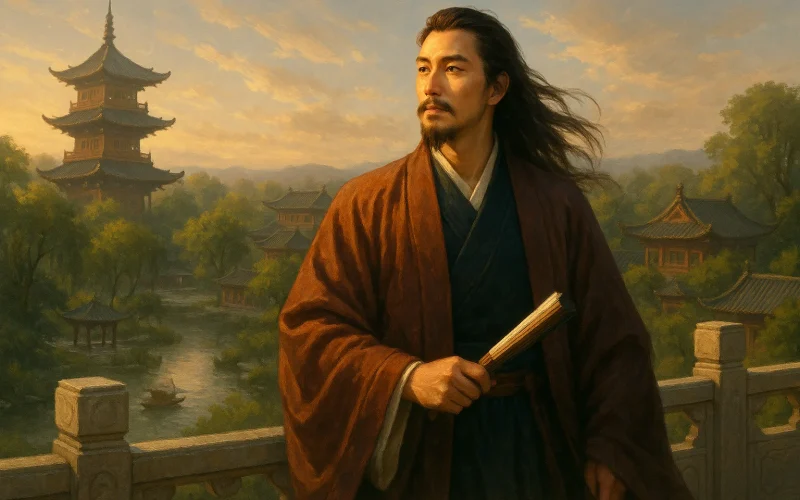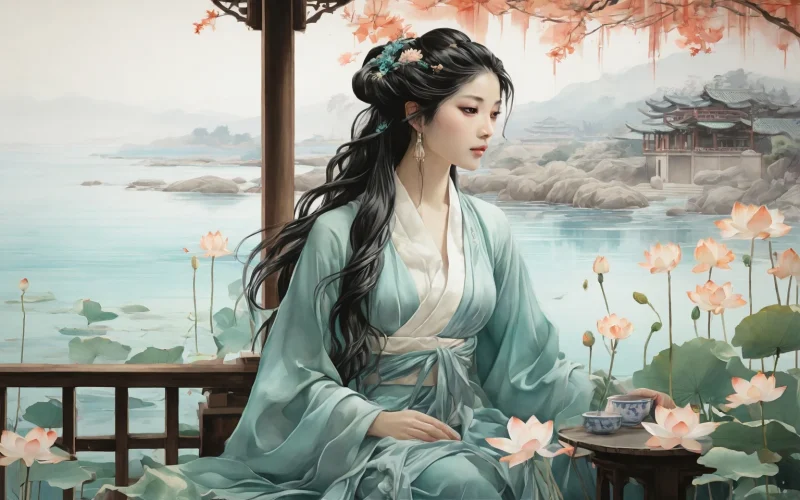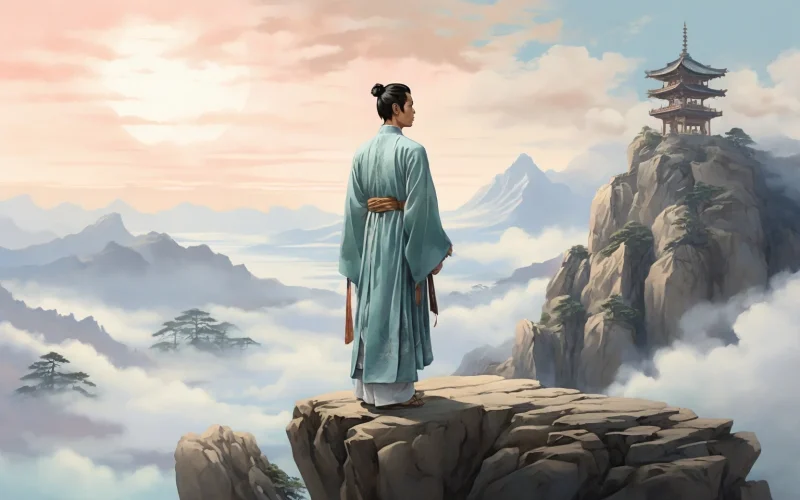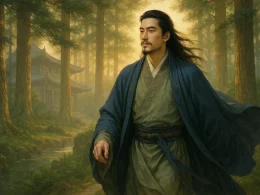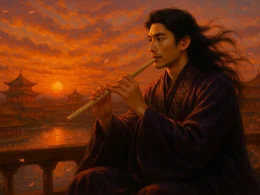Wang Anshi (王安石 1021 - 1086), a native of Linchuan in Jiangxi, was an outstanding statesman, writer, and thinker of the Northern Song Dynasty, counted among the "Eight Great Prose Masters of the Tang and Song Dynasties." As the driving force behind the "Xining Reforms," his literary works also embodied a spirit of bold innovation. His essays were rigorously logical and incisive, with Reading the Biography of Lord Mengchang overturning traditional historical discourse in just eighty-eight words, showcasing the sharpness of a political theorist. His poetic achievements were particularly profound—his early works, filled with heroic language, revealed the ambition of a reformer. Though his ci poetry was few in number, it pioneered new realms of historical reflection. His poetry and prose combined intellectual depth with artistic value, and the over 1,500 works preserved in The Collected Works of Linchuan stand as a monumental testament to literary innovation in Song Dynasty literature.
Major Works
Life
Wang Anshi was born in the fifth year of the Tianxi era (1021) during the Northern Song Dynasty. His family had long resided in Linchuan, Fuzhou (modern-day Fuzhou, Jiangxi), belonging to the local scholarly elite. His father, Wang Yi, served as a county and prefectural official, while his mother, Lady Wu, came from a literati background. As a child, Wang Anshi traveled with his father to various postings, witnessing firsthand the hardships of the common people. In the eighth year of the Tiansheng era (1030), at the age of ten, he began a systematic education in Shaozhou (modern-day Shaoguan, Guangdong), where he displayed astonishing memory and comprehension. In the second year of the Qingli era (1042), at twenty-two, he passed the imperial examinations, ranking fourth among the jinshi, thus embarking on his official career.
In the early stages of his career, Wang Anshi held positions such as judicial officer of the Huainan military circuit and magistrate of Yin County (1047–1050). During his tenure in Yin County, this young official demonstrated extraordinary administrative talent—organizing the people to construct water conservancy projects, establishing the Green Sprouts Loan system, and founding county schools to cultivate talent. These early practices became the prototypes for his later reform policies. In the first year of the Zhihe era (1054), recommended by Ouyang Xiu, he was appointed to the capital as a supervisor of the imperial herds, yet he repeatedly declined prestigious academic posts, preferring to exercise his ambitions in local governance. In the third year of the Jiayou era (1058), he submitted the Ten Thousand Word Memorial to Emperor Renzong, systematically proposing his reformist views. Though they were not adopted, the memorial sent shockwaves through the court.
In the fourth year of the Zhiping era (1067), Emperor Shenzong ascended the throne, and this reform-minded young ruler found deep ideological alignment with Wang Anshi. In the first year of the Xining era (1068), Shenzong, overriding opposition, appointed Wang Anshi as a Hanlin academician. The following February, Wang Anshi was promoted to Vice Chief Councillor and established the Finance Planning Commission, initiating the New Policies. Over the next five years, he successively introduced a series of reform measures, including the Equitable Transport Law, Green Sprouts Law, Farmland Irrigation Law, Hired Service Law, Market Exchange Law, and Baojia Mutual Security System, collectively known as the "Xining Reforms." In the third year of Xining (1070), Wang Anshi rose to the position of Chief Councillor (Chancellor), reaching the pinnacle of his political career.
The reform process was fraught with intense conflict. Conservative factions led by Sima Guang and Su Shi vehemently opposed the New Policies, leading to protracted political struggles in the court. In the seventh year of Xining (1074), due to frequent natural disasters and conservative pressure, Wang Anshi was dismissed from his chancellorship and appointed prefect of Jiangning. He was reinstated the following year, but the momentum of reform had significantly weakened. In the ninth year of Xining (1076), the death of his beloved son, Wang Pang, left him disheartened, and he resigned from the chancellorship once more, retiring to his Half Hill Garden in Jiangning. In the eighth year of the Yuanfeng era (1085), Emperor Shenzong passed away, and the conservatives regained power, abolishing all the New Policies. The following April, this controversial reformer died in grief and indignation at the age of sixty-six. The court posthumously honored him as Grand Tutor and granted him the posthumous title "Duke Wen," hence his later designation as Wang Wengong.
Literary Achievements
Wang Anshi's literary accomplishments were as illustrious as his political reforms. As one of the "Eight Great Prose Masters of the Tang and Song," his poetry and prose stood out distinctly, forming a unique style known as the Jinggong Style. The extant Collected Works of Linchuan contains over 1,500 pieces, spanning political essays, letters, travel accounts, epitaphs, and poetry, each category boasting timeless masterpieces.
- Political essays best reflect Wang Anshi's political wisdom and reformist thought. His Ten Thousand Word Memorial to Emperor Renzong systematically analyzed the social crises of the mid-Northern Song, advocating for "changing the corrupt laws of the world." Memorial on a Century of Peace incisively dissected the systemic flaws beneath apparent prosperity. Reply to Sima Guang's Criticism was a sharp counterattack against conservative opposition, with assertions such as "People have long been accustomed to complacency; officials often consider neglecting state affairs and pandering to vulgar tastes as virtuous"—statements that remain thought-provoking today. These essays are tightly reasoned and powerfully argued, showcasing the strategic foresight of a statesman.
- Scholarly works demonstrate Wang Anshi's erudition and innovative spirit. His Commentary on the 'Great Plan' reinterpreted Confucian classics, proposing new insights into the Five Elements Theory. Explanations of Characters sought to derive philosophical principles from the structure of Chinese characters—though often forced, it reflected his independent thinking. Philosophical works like Annotations on Laozi and Miscellaneous Notes on Huainanzi synthesized Confucian, Buddhist, and Daoist thought, constructing his own theoretical system. Though many of these works are lost, the surviving fragments still reveal the sharpness of his intellect. Zhu Xi remarked, "Jinggong's scholarship has aspects that cannot be matched."
- Poetic composition represents the pinnacle of Wang Anshi's literary achievements. His poetic style can be divided into two periods, demarcated by his resignation from the chancellorship in 1076. Early works like The People of Hebei—"This year's drought scorches the land for miles, yet counties still press for canal labor"—directly addressed social contradictions. Monopolies—"In the Three Dynasties, the people were like children; public and private wealth were undivided"—expressed his reformist ideals. Song of Mingfei—"Her grace could never be captured by brush; poor Mao Yanshou died in vain"—used historical allusion for contemporary critique. These works engaged with reality in a bold, straightforward style. After retiring to Jinling, his poetry shifted toward refined subtlety. Written on the Wall of Master Huyin—"Under the thatched eaves, swept clean of moss, flowers bloom in neat rows"—was fresh and natural. Mooring at Guazhou—"Spring wind greens the southern shore again; when will moonlight guide me home?"—exemplified his meticulous diction. Northern Mountain—"Sitting long, I count fallen petals; wandering slow, I seek sweet grass"—captured leisurely contemplation. These works pushed the Song poetic traits of "using erudition in poetry and discourse in poetry" to their zenith.
- Miscellaneous prose and letters reveal the richness of Wang Anshi's inner world. Record of a Journey to Baochán Mountain drew life philosophy from cave exploration: "The world's most marvelous sights often lie in perilous remoteness." Lament for Zhongyong used the story of a child prodigy's decline to emphasize the importance of education. Reply to Zeng Gong discussed scholarship with his friend, showcasing their profound friendship. These short essays were pithy yet profound, blending literary merit with intellectual depth.
Artistic Style
The formation of Wang Anshi's literary style was inseparable from his political boldness, philosophical reasoning, and poetic talent. This unique fusion endowed his works with profound thought, innovative form, and refined language.
- In content, his works were imbued with a strong reformist consciousness. He advocated that "literature should serve practical purposes," opposing the ornate Xikun Style. In Reply to Zeng Gong, he stated, "What we call literature must contribute to the world." Letter on Literature emphasized, "Literature is the vehicle of ritual, governance, and statecraft." This pragmatic view kept his works closely tied to contemporary issues. Salt Monopoly exposed flaws in salt administration; Opening the Granaries criticized inadequate disaster relief; Reflections on Current Affairs lamented bureaucratic corruption. Even historical poems like Jinling Nostalgia—"The conqueror took two rivers alone; his descendants surrendered cities by the hundred"—harbored reflections on contemporary politics.
- In form, Wang Anshi boldly broke conventions. His political essays were rigorously structured yet dynamic—Ten Thousand Word Memorial to Emperor Renzong employed a "general-specific-general" framework, first outlining problems, then analyzing causes, and finally proposing solutions, progressing layer by layer into a cohesive whole. His poetry was even more innovative. Song of Mingfei shattered the tragic tone of traditional Zhaojun narratives, infusing them with historical insight. Journey to Peach Blossom Spring retold Tao Yuanming's tale in heptasyllabic ancient verse, imbuing it with new meaning. This creativity extended to poetic forms—he composed numerous cento poems and herb-acrostic verses, playful yet displaying unconstrained ingenuity.
- In language, Wang Anshi pursued a "seemingly ordinary yet strikingly original" effect. He believed poetic diction should "express one's own ideas." The repeated refinement of "green" in Mooring at Guazhou became a model of wordcraft. Written on the Wall of Master Huyin—"One stream guards fields, encircling green; two mountains push through gates, delivering verdure"—subtly alluded to Han Dynasty texts without trace. His prose was concise and piercing—Reply to Sima Guang contained phrases like "refuting fallacies and repelling petty men," terse yet forceful. This style inherited Han Yu's mandate to "eschew clichés" while bearing distinct personal traits, later summarized as "lean, vigorous, and divinely inspired."
Legacy
Wang Anshi's intellectual legacy extended far beyond literature. His political reforms, philosophical thought, and educational practices collectively formed a rich, complex system that profoundly influenced China's historical trajectory.
- Political reforms: The New Policies constituted the most comprehensive institutional transformation in ancient Chinese history. The Green Sprouts Law aimed to replace usury with government loans; the Hired Service Law converted corvée labor into paid service, alleviating peasant burdens; the Market Exchange Law established state commerce to stabilize prices; the Baojia System strengthened local security. Though these measures ultimately failed due to poor implementation and conservative opposition, their principles—"enriching the state without increasing taxes" and "generating wealth through the people's labor"—remain relevant. Liang Qichao's Critical Biography of Wang Anshi hailed him as "the only complete statesman after the Three Dynasties," an overstatement perhaps, but indicative of his historical stature.
- Philosophy: Wang Anshi developed the distinctive New Learning of Jinggong. Reinterpreting Confucian classics, he viewed Rites of Zhou as a governance blueprint, Book of Documents as containing statecraft essence, and Book of Songs as reflecting folk sentiment. In human nature theory, he proposed "nature and emotions are one," rejecting the good-evil dichotomy. Epistemologically, he stressed "learning requires doubt," advocating independent thinking. Though condemned as "heterodox" by Cheng-Zhu Neo-Confucianism, his thought was a vital strand in Song Confucianism's development. Modern scholar Yu Yingshi noted that Wang Anshi's scholarship embodied "the Confucian spirit of practical statecraft."
- Education: Wang Anshi promoted the Three Halls System. In 1071, he implemented it in the Imperial Academy, dividing students into Outer, Inner, and Upper Halls, advancing through regular examinations—pioneering tiered education in ancient China. He also reformed the examination system, replacing poetry with policy essays, emphasizing practical learning. Though abolished with the reforms' failure, these innovations deeply influenced later civil examinations and education.
- Cultural impact: Wang Anshi's image underwent complex historical shifts. Southern Song historiography painted him as a "subverter of ancestral laws." Ming Dynasty reformers like Zhang Juzheng rediscovered his value. Modern scholars like Liang Qichao and Hu Shi rehabilitated him. In literature, his works were consistently revered—Lu You praised his poetry's "awe-inspiring vitality"; Liu Xizai lauded his prose's "lean, divine vigor." Contemporary scholar Qian Mu judged: "Among Northern Song writers, Wang Anshi's essays are the most austere." In the 1980s, the International Astronomical Union named a lunar crater "Wang Anshi", signifying global recognition.
- Personal character also shaped his legacy. Living simply and unpretentiously, he was called the "Stubborn Duke." As an official, he refused gifts—even opponents acknowledged his integrity. He revised Explanations of Characters into old age, rigorous in scholarship. Though politically opposed to Sima Guang, they privately respected each other. This fusion of idealism and pragmatism epitomized the Confucian scholar's ethos: "In obscurity, cultivate oneself; in prominence, benefit the world." As the History of Song noted: "Anshi was obstinate yet principled, unwavering in conviction." Through triumphs and defeats, this Northern Song reformer left an indelible mark on Chinese civilization.






